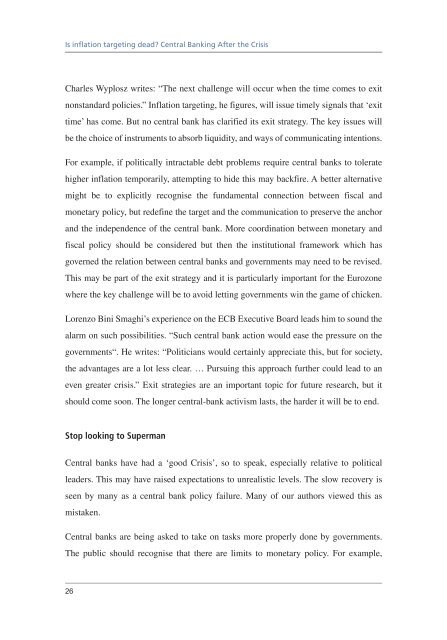You also want an ePaper? Increase the reach of your titles
YUMPU automatically turns print PDFs into web optimized ePapers that Google loves.
Is <strong>inflation</strong> <strong>targeting</strong> dead? Central Banking After the CrisisCharles Wyplosz writes: “The next challenge will occur when the time comes to exitnonstandard policies.” Inflation <strong>targeting</strong>, he figures, will issue timely signals that ‘exittime’ has come. But no central bank has clarified its exit strategy. The key issues willbe the choice of instruments to absorb liquidity, and ways of communicating intentions.For example, if politically intractable debt problems require central banks to toleratehigher <strong>inflation</strong> temporarily, attempting to hide this may backfire. A better alternativemight be to explicitly recognise the fundamental connection between fiscal andmonetary policy, but redefine the target and the communication to preserve the anchorand the independence of the central bank. More coordination between monetary andfiscal policy should be considered but then the institutional framework which hasgoverned the relation between central banks and governments may need to be revised.This may be part of the exit strategy and it is particularly important for the Eurozonewhere the key challenge will be to avoid letting governments win the game of chicken.Lorenzo Bini Smaghi’s experience on the ECB Executive Board leads him to sound thealarm on such possibilities. “Such central bank action would ease the pressure on thegovernments“. He writes: “Politicians would certainly appreciate this, but for society,the advantages are a lot less clear. … Pursuing this approach further could lead to aneven greater crisis.” Exit strategies are an important topic for future research, but itshould come soon. The longer central-bank activism lasts, the harder it will be to end.Stop looking to SupermanCentral banks have had a ‘good Crisis’, so to speak, especially relative to politicalleaders. This may have raised expectations to unrealistic levels. The slow recovery isseen by many as a central bank policy failure. Many of our authors viewed this asmistaken.Central banks are being asked to take on tasks more properly done by governments.The public should recognise that there are limits to monetary policy. For example,26



